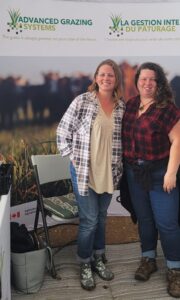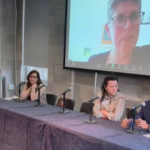Guest post by Dr. Brooke McWherter
Across the country right now farmers, farmer organizations, federal and university scientists, industry partners and more are working together to identify and test innovative agricultural practices on working farms to support sustainable production on farms. Called Living Labs (LL), these innovation hubs aim to bring together many of the diverse stakeholders in the agricultural food system to identify, develop and test innovative practices that aim to promote adoption and support Canada’s greenhouse gas emissions reduction goals.
However collaboration of this scale is never easy and strategic planning can support diverse collaborative networks in identifying connections and create opportunities for finding commonalities among the diverse projects everyone is engaging in. This is where I fit in. As a natural resource social scientist, one of my passions is understanding collaborations and supporting collaborative efforts.
My first workshop with the living labs occurred during the New Brunswick Living Lab (NB-LL) Annual Update and Planning workshop where I discussed my research on barriers to adoption and monitoring progress. Working with NB-LL partners we discussed the importance of setting clear roles and expectations and I led participants through a 1-hour workshop developing logic models for each commodity group within the LL. Logic models are useful tools because they allow for partners and organizations to clearly demonstrate their logic for how their activities will lead to specific goals and outcomes of the program. They can also be used for follow-up monitoring and evaluation.
Following this workshop, I met several other Atlantic LL leads who were present, and I was invited to Newfoundland to conduct a 7-hour two-day workshop with all of their partners. Together we first did a partnership mapping exercise which mapped out the different partners and their connections to other groups and then we completed an extended logic model that not only looked at planned activities but also their status which were then compared to current tracking documents.
As a facilitator both of these workshops really highlighted the complexity of running a living lab and what it means to co-produce knowledge. We often say we want more stakeholders involved but the more organizations in a project the harder it can be to keep everyone on the same page, to follow all of the projects involved, and to overcome institutional hurdles such as low incentives for co-creation projects, data sharing restrictions, and partners with high responsibility loads.
However what these experiences and my most recent facilitation role with the Atlantic LL in identifying shared success factors show is the power of relationships. The Atlantic LL team leads from Nova Scotia, New Brunswick, PEI, and Newfoundland really exemplify the types of leaders that have been recruited for this project and the power that comes from collaboration and working together. The different leads are often present at each other’s workshops, work to build cross-provincial connections and projects and support each other in the co-production process. After all no one knows better than them what they are going through.
It has been an amazing experience to work with the Atlantic Living Labs and support their efforts to improve collaboration, co-production, and cross-provincial comparison. I personally can’t wait to see what they come up with in the future.











